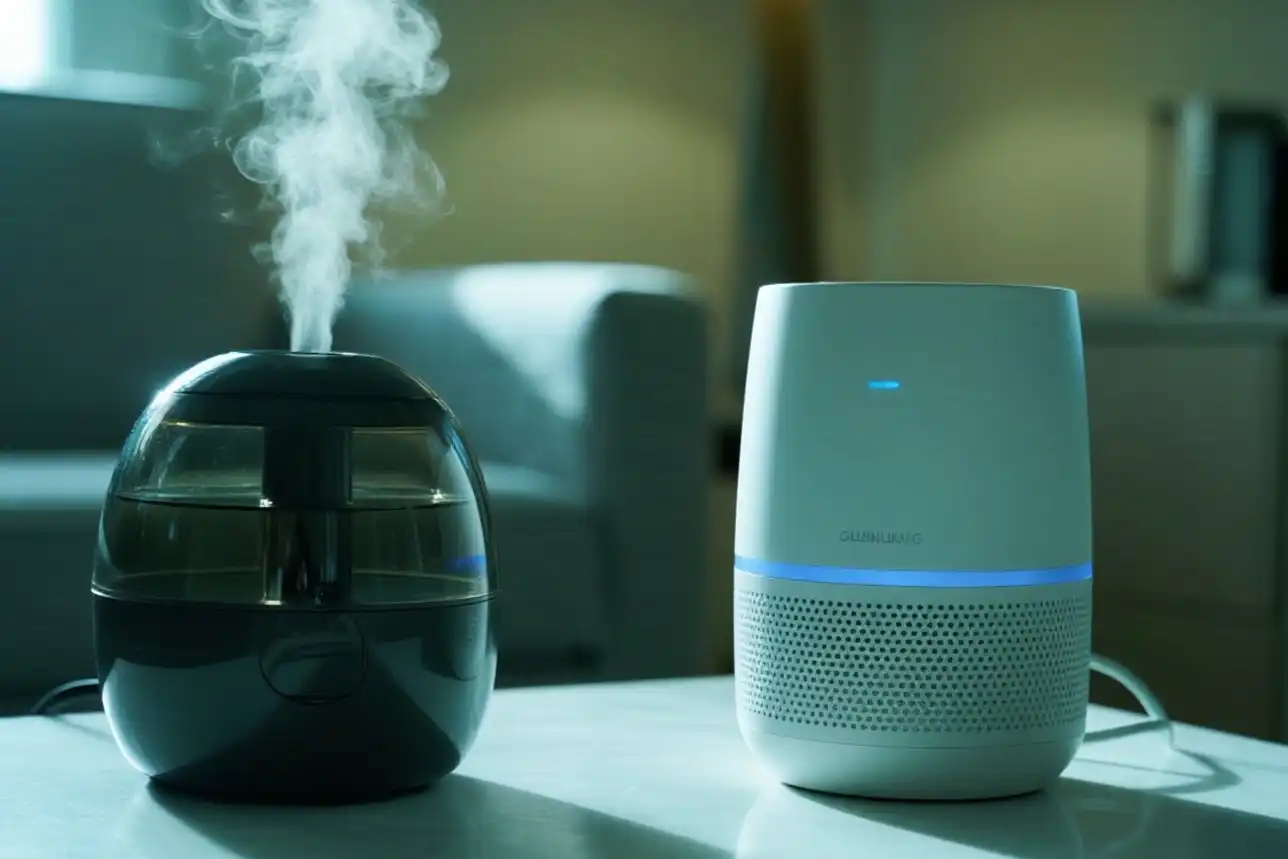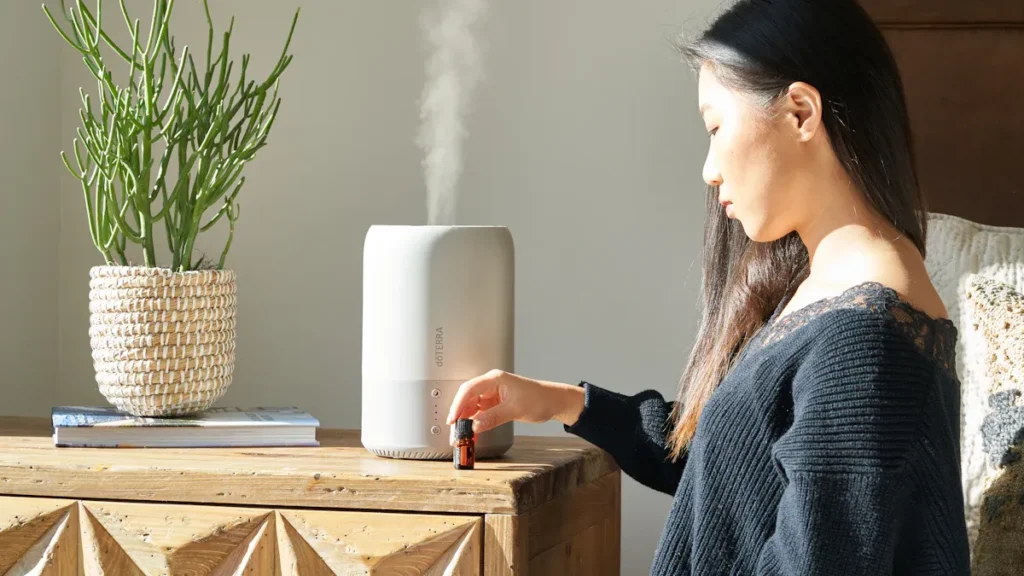
The best device for your health depends on what you need. Air purifiers take out things like allergens, smoke, and mold from the air. Humidifiers put water in the air to help with dry skin and sore sinuses. Humidifiers and air purifiers each do something different. Many health problems, like asthma, allergies, and anxiety, can come from bad air inside. You can look at the table below to see how both devices help your health.
Key Takeaways
- Humidifiers put water into dry air. This helps with dry skin, sore throats, and nosebleeds. They are helpful in winter or dry places.
- Air purifiers make the air cleaner. They take out dust, pollen, smoke, and allergens. This helps people with allergies and asthma breathe better.
- Using both a humidifier and an air purifier can help a lot. It makes the air more comfortable and clean. It keeps the right amount of water in the air.
- Clean humidifiers and air purifiers often. This stops mold and germs from growing. It also helps the machines work well.
- Pick the device that fits your needs. Use a humidifier if the air is dry. Use a purifier if you have allergies or there is pollution. Always check the humidity in your home.
Quick Comparison
Main Differences
You may wonder how humidifiers and air purifiers are different. The biggest difference is what each one does for your home and health. Humidifiers put water into the air. This helps when the air is dry, like in winter or dry places. Air purifiers take out dust, pollen, smoke, and other small things that can make you sneeze or feel sick.
Here is a quick table to show the differences:
| Feature/Aspect | Humidifier | Air Purifier |
|---|---|---|
| Primary Function | Adds moisture to the air | Removes airborne pollutants and allergens |
| Health Benefits | Relieves dry skin, throat, nose, and eyes | Reduces allergy and asthma symptoms, improves air quality |
| Best Use Cases | Dry climates, winter, dry skin or sinus issues | Allergy sufferers, asthma, homes with pets or smokers |
| Limitations | Does not remove pollutants or allergens | Does not add moisture or help with dryness |
| Extra Notes | Too much moisture can cause mold | Needs filter changes for best results |
Tip: Humidifiers and air purifiers do not do the same job. You might need both if you want clean air and the right amount of moisture.
Health Impacts
Humidifiers and air purifiers help your health in different ways. Air purifiers use special filters to clean the air. These filters catch dust, pollen, pet dander, smoke, and some germs. If you have allergies or asthma, an air purifier can help you breathe better. Studies say a HEPA air purifier can lower allergy symptoms by up to 30%. Air purifiers work best in the room where you put them. You may need more than one for your whole house.
Humidifiers do not clean the air. They add water vapor to make the air less dry. This helps if you have dry skin, a sore throat, or nosebleeds. Doctors say indoor humidity should be between 30% and 50% for comfort. Humidifiers can help you feel better when you have a cold or the flu. They make it easier to breathe and soothe your throat. Some studies say a humidifier may even lower the spread of some viruses in the air.
Both devices need regular cleaning. If you do not clean a humidifier, mold can grow inside and get into the air. Air purifiers need new filters to keep working well.
- When to use a humidifier:
- You have dry skin, a sore throat, or nosebleeds.
- The air feels dry, especially in winter.
- You want to stop wooden furniture from cracking.
- When to use an air purifier:
- You have allergies or asthma.
- You live with pets or in a smoky or polluted place.
- You want to lower dust and airborne germs.
Humidifiers and air purifiers each help make your home healthier. You can pick one or both, depending on what you need.
Humidifiers and Air Purifiers
How They Work
Humidifiers and air purifiers help your air in different ways. There are many types of humidifiers. Some use heat to make steam from water. This steam goes into the air. Others use spinning disks or ultrasonic waves to make a light mist. Some use special materials that let water slowly leave into the room. Many humidifiers have safety parts like thermostats. These stop them from getting too hot and keep the humidity safe.
Air purifiers pull air through filters. The most common filter is the HEPA filter. It catches tiny things like dust, pollen, and smoke. Some air purifiers also use activated carbon filters. These help take away smells and chemicals called volatile organic compounds (VOCs). The Clean Air Delivery Rate (CADR) tells you how well an air purifier works. It shows how much dust and pollen it can remove. Most air purifiers do not take out gases like carbon dioxide.
Note: Humidifiers put moisture in the air but do not clean it. Air purifiers clean the air but do not add moisture.
What They Do
You use humidifiers and air purifiers for different reasons. Humidifiers help when your home feels dry. Dry air can give you dry skin, sore throats, and nosebleeds. The Environmental Protection Agency says to keep indoor humidity between 30% and 50%. This helps you breathe and keeps your nose and throat moist. If the air is too dry, you may feel bad or get sick more often.
Air purifiers help people with allergies or asthma. They take out dust, pollen, smoke, and some chemicals from the air. This makes it easier to breathe and can lower allergy problems. Air purifiers work best in the room where you put them. You may need more than one to clean the air in your whole house.
If you want clean air and the right moisture, you may need both devices.
Health Benefits

Air Purifier Benefits
Air purifiers can make the air in your home cleaner. They take out dust, pollen, pet dander, and smoke from the air. If you have allergies or asthma, you might feel better when you use one. Studies say air purifiers lower tiny particles in your house. In one study, kids with asthma needed less medicine after using an air purifier. You might also breathe easier and have fewer asthma attacks.
Air purifiers with HEPA filters can cut down tiny particles by half. This helps you breathe cleaner air and feel healthier.
Researchers found that air purifiers help people in polluted homes. They saw better blood pressure, less swelling, and stronger heart and lungs. Some studies say air purifiers may help people live longer and go to the hospital less. The Asthma and Allergy Foundation of America says to pick a purifier with a certified filter. Make sure you get the right size for your room and change the filter often.
- Air purifiers can:
- Lessen allergy and asthma problems
- Lower the chance of breathing issues
- Help you sleep better
- Get rid of smells and some germs
Humidifier Benefits
A humidifier puts water into dry air. It can help with dry skin, sore throats, or nosebleeds. Doctors say indoor humidity should be between 30% and 50%. Humidifiers help you breathe better, especially in winter or when you use heat inside.
Tip: Always use distilled water and clean your humidifier often. This stops germs or minerals from getting into the air.
If you do not clean your humidifier or use tap water, bad minerals or germs can get out. Kids are more at risk from these problems. Experts say to clean your humidifier often and use distilled water to keep it safe. Humidifiers and air purifiers both help your home, but each one is best for different needs.
- Humidifiers can:
- Soothe dry skin and lips
- Help with sinus and throat pain
- Lower nosebleeds
- Keep wooden furniture from cracking
Choosing for Health Needs
Allergies and Asthma
If you have allergies or asthma, you want to breathe air that is as clean as possible. Air purifiers with HEPA filters can help you by removing tiny particles like pollen, pet dander, and mold spores from the air. The Environmental Protection Agency (EPA) says that HEPA filters can trap up to 99.97% of particles as small as 0.3 microns. This means you can reduce many common allergy triggers in your home. You should choose an air purifier with a clean air delivery rate (CADR) that matches the size of your room. Some air purifiers, such as ionic or electrostatic types, may create ozone, which can irritate your lungs. Experts do not recommend these for people with asthma or allergies.
Allergists also say you should keep indoor humidity below 50%. Too much moisture can help dust mites grow, and dust mites are a big trigger for allergies and asthma. If you use a humidifier, watch the humidity level closely. Cool mist humidifiers are safer for children than warm mist types. Some devices combine air purifiers and humidifiers, but you need to make sure the filter does not get damp, or it will not work well.
Tip: Air purifiers help most when you have allergies to things in the air. Humidifiers can make allergies worse if you let the air get too wet.
- Studies show that:
- HEPA filters alone may not help much if you have pets and keep them in the house.
- Removing pets or cleaning up mold and dust works better for asthma control.
- Air purifiers are one part of a bigger plan to manage allergies and asthma.
Dryness and Sinus Relief
Dry air can make your nose, throat, and skin feel uncomfortable. You might notice dry skin, cracked lips, or even nosebleeds. Heating and air conditioning systems often dry out the air in your home, especially in winter. Humidifiers add moisture back into the air, which helps you feel better.
Medical experts explain that dry air can irritate your nasal passages and sinuses. This can cause swelling, thick mucus, and even pain. When you use a humidifier, you add moisture to the air. This helps thin out mucus and soothes your nose and throat. You may find it easier to breathe, and your nose will not feel as dry. Moist air can also help with dry eyes and make you more comfortable if you have sinus problems.
| Aspect | Details |
|---|---|
| Causes of dry air | Cold weather, heating, air conditioning |
| Effects on health | Dry skin, sinus pain, nosebleeds, cracked lips |
| How humidifiers help | Add moisture, soothe airways, prevent dryness |
| Best humidity range | 30%-50% |
- Common causes of dry indoor air:
- Cold air from outside in winter
- Heating systems that do not add moisture
- Air conditioning that dries out the air
Note: Always keep your humidifier clean. If you do not, mold and bacteria can grow inside and make you sick.
Babies and Elderly
Babies and older adults need special care when it comes to air quality. Their lungs are more sensitive, and they can get sick more easily from dirty or dry air. Fine particles in the air, called PM2.5, can hurt babies’ lungs and even affect their brain development. If you are pregnant or have a newborn, clean air is very important. Studies show that air purifiers with HEPA filters can lower the amount of these tiny particles in your home. This helps protect babies from problems like asthma, low birth weight, and even some developmental issues.
For children, high levels of indoor dust and pollution can lead to more asthma attacks and breathing problems. Poor air quality can also make older adults feel worse if they have heart or lung disease. In nursing homes, using air purifiers has lowered the number of people with breathing complaints by 25%. Cleaner air also means fewer allergens and less mold, which helps everyone breathe easier.
Humidifiers can also help babies and seniors, especially if the air is dry. Dry air can make it hard for babies to sleep and can cause nosebleeds or dry skin. For older adults, dry air can make breathing harder and cause coughing. You should use a humidifier to keep the air comfortable, but always keep the humidity below 50% to stop mold and dust mites from growing.
- For infants and seniors:
- Air purifiers lower the risk of breathing problems from pollution and dust.
- Humidifiers help prevent dry skin, nosebleeds, and coughing.
- Always keep both devices clean to avoid germs and mold.
🍼 Tip: Babies and seniors benefit most from clean, moist air. Use both devices wisely for the best results.
When to Use Both
Combination Devices
Sometimes you want to save space or make things simple. You can pick a combination device that is both an air purifier and a humidifier. These machines clean the air and add moisture at the same time. Many people in small homes or apartments like these for their ease.
Benefits of combination devices:
- They save space, which is good for small rooms.
- Some models keep water away from air parts to stop fungus.
- You only need to care for one machine instead of two.
Drawbacks to consider:
- Cleaning and caring for each part is different.
- If you do not watch the humidity, mold can grow.
- Experts say using two separate machines works better for most people.
- There are not many all-in-one choices, and some, like the Dyson Pure Humidify + Cool, cost a lot.
Stores say these 2-in-1 machines are now very popular. In some places, they sold more than single units by 37% in one quarter. Stores also make more money from these devices. Still, you should think about what you need and how much you want to spend before you buy one.
Tip: Experts say you get the best results and easy care if you use separate air purifiers and humidifiers.
Home Environment
Many things affect the air in your home. You might need both an air purifier and a humidifier if you have more than one air problem.
Common reasons to use both:
- You live where the air is dry or use heat that dries out the air.
- You see dust, pet dander, or pollution in your house.
- You or your family have allergies, asthma, or trouble breathing.
- Dry air gives you dry skin, sore throats, or cracks in wood.
Using both devices helps you control dust and dryness. Air purifiers take out dust, smoke, and allergens. Humidifiers add water to stop the air from being too dry. Together, they help make your home healthy and balanced.
| Indoor Pollutant | WHO Recommended Limit |
|---|---|
| Benzene | 0.1 ppm |
| Carbon monoxide (CO) | 35 ppm |
| Formaldehyde | 0.1–0.3 ppm |
| Nitrogen dioxide (NO2) | 3 ppm |
| PM2.5 | 10 μg/m³ annual mean |
The World Health Organization says to keep your air clean and let in fresh air. You can open windows or use fans, but sometimes that is not enough. Air purifiers and humidifiers help you reach these goals, especially if you live in a city or a dry place.
🏠 Note: You can use both machines at the same time. This gives you clean and comfy air all year, no matter where you live.
You need to pick a humidifier or air purifier based on your health and home. Air purifiers with HEPA filters can lower tiny particles in the air. There are no numbers like this for humidifiers. Experts say you should match the device to your symptoms. Use an air purifier for allergies. Use a humidifier if the air feels dry. Each device helps in its own way. Too much humidity can cause trouble. Air purifiers do not take the place of cleaning your home. Ask your doctor if you want advice just for you.
FAQ
Can you use a humidifier and air purifier in the same room?
Yes, you can use both at once. The air purifier makes the air cleaner. The humidifier puts water into the air. This gives you air that feels nice and clean. Keep them apart so the mist does not block the purifier’s filter.
Do humidifiers help with allergies?
Humidifiers do not take out allergens. They only add water to the air. If dry air hurts your nose or throat, a humidifier helps. For allergies, you need an air purifier to get rid of dust, pollen, and pet dander.
How often should you clean a humidifier or air purifier?
Clean your humidifier every three days. Change the water every day. For air purifiers, check and change filters every one to three months. Clean machines work better and help keep you healthy.
Can an air purifier make the air too dry?
No, air purifiers do not take water out of the air. They only clean out things like dust and pollen. If your air feels dry, use a humidifier to add water.
Is it safe to use a humidifier every night?
Yes, you can use a humidifier each night. Keep the humidity between 30% and 50%. Clean the humidifier often. Too much water or a dirty humidifier can cause mold or germs.
See also
The benefits of air purifiers for illness prevention and health improvement
Do Air Purifiers Make a Difference for Dust Allergies
How Humidifiers Impact Dust and Cleanliness in Your Space
Are Air Purifiers Effective for Relieving Chronic Stuffy Nose
